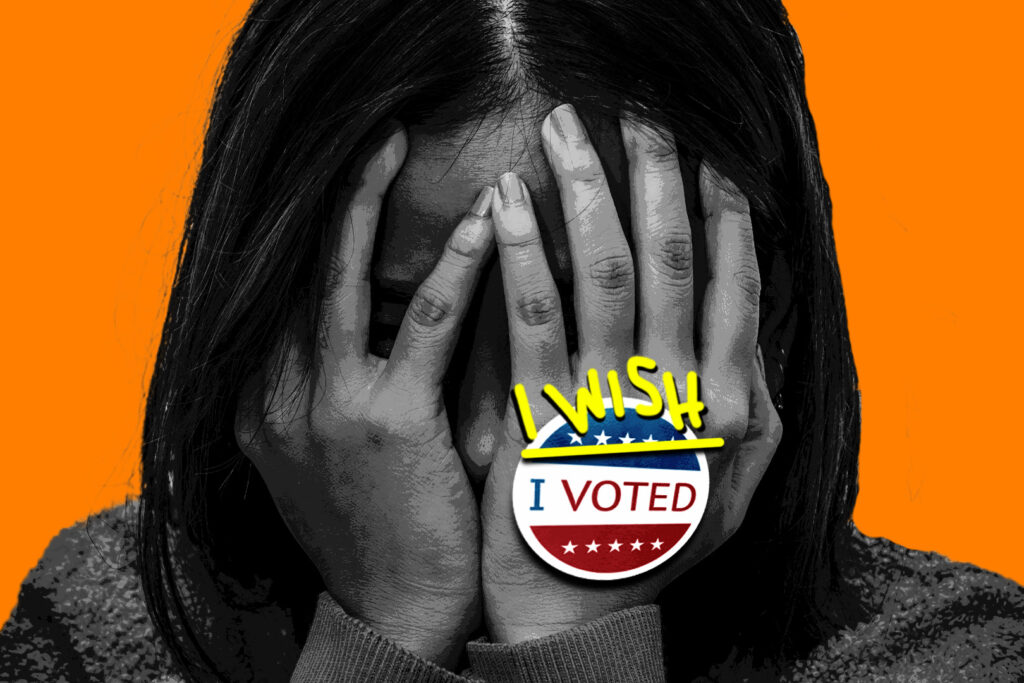
To the reluctant voter,
In November of 2024, I too was hesitant to exercise my right to vote. It was my first time being of age to vote in a presidential election, and I let that significant moment fall through my fingertips out of some belief that my voice wasn’t credible or strong enough. I also felt unprepared to make an informed decision for my home state of California’s congressional, state and local leadership. On a deeper level, I felt completely overwhelmed with the weight of those potential decisions. I didn’t vote, and now I am forced to grapple with the guilt of having ignorantly chosen complacency.
Much to my surprise, this was not an isolated experience. After the general election back in November, in one of my classes, we were asked to raise our hands if we voted — and only about half the room did. Even more startlingly, researchers estimate that almost 60% of young voters ages 18-29 did not cast a vote. I hope you as a reluctant voter and the almost 90 million non-voters will learn from or at least see the gravity of these mistakes. As you can probably imagine, with Trump’s policy in full swing now — from tariffs and the economy to free speech — I have learned my lesson. I regret not speaking up when I had a better chance of being heard.
It wasn’t that I didn’t care, but rather I let myself be so overwhelmed by the weight of my potential vote that I shut down.
“Undecided voters,” as research on previous elections implies, often exhibit more emotions such as anger than decided voters and more critical, distrusting viewpoints of the political system, which are traits that suggest careful deliberation or even decision paralysis rather than apathy.
I fit that mold perfectly, and maybe you do too. Perhaps like me, your desire to consider every angle, to fully grasp the complexities of each issue, became a double-edged sword. Instead of guiding me toward a decision, my thoughts trapped me in a cycle of overanalysis and hesitation. Rather than using my uncertainty as a catalyst to seek more information, I let it paralyze me.
Beyond the decision paralysis, there are other reasons for abstention. I, for one, didn’t think politics directly affected me. I was in the “black hole” of studying engineering, convinced nothing else mattered beyond my grades and graduation. That hustle can distract students from pivotal political moments, not to mention workers who know that a day off work means not making rent.
Some more sympathetic or naive individuals would call our inaction “staying neutral.” I wish that at the time I knew that neutrality was an illusion — by choosing not to engage, I ultimately chose to accept my current reality. Because inaction is a choice.
Finally, I chose not to vote out of fear. Yet now, I’m living in constant fear, on alert, activated, agitated. Every day I see headlines about reckless policies, economic shifts, another executive order, or cataclysmic decision, and I feel a piece of me die inside. Looking forward, it will only get worse as President Trump continues breaking things that will take decades to fix.
If this national guilt weren’t enough, I am also haunted by the fact that I could have made an impact back home. The 2024 California elections were vital, as every seat in the State Assembly was up for grabs, along with numerous state and federal positions. My home state was at a turning point, and I wasn’t there to contribute to the direction it took. But I should have been. My family lives there. The people I love will live with the consequences of policies I ignored. I should have thought beyond myself, beyond the immediate present, and considered the future I wanted for my home, my community, my country.
I’ve come to realize, passivity is a privilege we can not afford. I realize that as a cis, white female in college, it took a long time for President Trump’s actions to impact me, and I lived in my privileged bubble for far too long while hundreds of thousands of Americans experienced direct threats to both their identity and livelihood.
I now know that I could have prepared by being more engaged, more aware, more ready. Political decisions are never distant or impersonal, even if they feel that way. They shape the world we live in, whether we choose to participate or not. We must spend time reflecting on our values, current issues, and the future we want to see in this country. Once we understand ourselves, it is then time to understand our candidates and policies. This may seem daunting or time-consuming, but simple tasks like spending five minutes a day on our media of choice listening or reading current news, focusing on understanding pressing issues, is enough to make a difference.
From there we can start incorporating some brief glances at what is happening in upcoming elections, determining whether or not the candidates reflect our understanding and goals. While you may feel pressure to make a decision, remember that your research and interest makes you a responsible and informed citizen. Finally, after months of slow, but thorough research, when the midterm elections finally come around, maybe, just maybe we will see each other at the polls on Tuesday, November 3, 2026.
Sincerely,
A formerly reluctant voter
